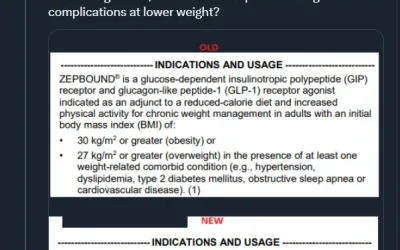The Quick Fix Epidemic: Why Modern Medicine Must Return to Root-Cause Care
In today’s healthcare landscape, we’re witnessing a concerning shift away from evidence-based, root-cause medicine toward quick fixes and temporary solutions. This transformation isn’t just a clinical issue – it represents a systemic failure that prioritizes convenience and short-term results over lasting patient health.
The Hidden Costs of Symptom-Based Treatment
The Testosterone Dilemma
Consider the growing trend of prescribing testosterone replacement therapy (TRT) for men with obesity-related secondary hypogonadism. Instead of addressing the underlying metabolic dysfunction through comprehensive care, TRT has become a default solution. This approach generates immediate prescription revenue and offers patients a quick, surface-level fix, but it ultimately avoids addressing complex metabolic issues while leaving the root cause untreated.
Cardiovascular Warning Signs: The ED Example
The treatment of erectile dysfunction (ED) illustrates another crucial example of this problematic approach. ED often serves as an early warning sign of cardiovascular disease, yet the standard approach of prescribing PDE5 inhibitors alone can mask significant cardiovascular risks. This generates recurring pharmaceutical revenue while bypassing essential cardiovascular evaluation. More concerningly, it silences important warning signs of underlying health issues that require immediate attention.
The Commercialization of Healthcare
Modern healthcare has increasingly become commoditized through several concerning channels. Compounding pharmacies, while valuable in specific cases, often blur the lines between personalized care and profit-driven practices. The limited oversight can result in inconsistent quality and unproven formulations, where marketability takes precedence over evidence-based value.
Direct-to-consumer marketing has further complicated this landscape. Through aggressive advertising and influencer partnerships, patients are encouraged to self-diagnose and seek treatments that bypass comprehensive clinical evaluation. This creates a troubling dynamic where patients become consumers, influenced more by marketing than clinical need.
Subscription-based models have transformed the traditional doctor-patient relationship into a transactional exchange. This shift creates pressure for rapid solutions and prioritizes volume over value, often exceeding even the limitations of traditional fee-for-service systems.
Systemic Barriers Driving Quick-Fix Solutions
The traditional healthcare system itself has erected barriers that frustrate both providers and patients, driving demand for quick-fix solutions. Extended wait times and complex referral processes delay essential care. Unclear pricing structures breed confusion and distrust, while insurance restrictions often deny medically necessary care and deprioritize preventive approaches.
Building a Better Healthcare Future
The path forward requires a fundamental shift in how we approach patient care. We must emphasize root-cause medicine by focusing on the fundamental drivers of disease rather than simply managing symptoms. This means implementing comprehensive treatment plans that prioritize long-term outcomes over quick fixes.
Transparency must become a cornerstone of medical practice. Clear pricing models and open communication can help rebuild trust between providers and patients. This transparency should extend to treatment decisions, ensuring they’re based on evidence rather than marketing pressure or convenience.
Enhanced oversight of healthcare marketing and pharmacy practices can help align commercial interests with public health goals. This includes stricter guidelines for pharmaceutical marketing and better regulation of compounding practices to ensure quality and safety.
Moving Forward
Real healthcare transformation demands a return to fundamentals: identifying and treating root causes rather than just managing symptoms. Providers need support in delivering thorough care without the distraction of financial pressures. Patients need education about long-term health outcomes and the tools to make informed decisions about their care.
Creating a healthcare system that truly serves its purpose requires rejecting superficial solutions in favor of comprehensive, evidence-based care. Only by recommitting to these principles can we help people achieve lasting health and wellness, rather than temporary relief.
The message for healthcare providers and patients alike is clear: lasting health outcomes require more than temporary solutions. They demand comprehensive care, patient education, and an unwavering commitment to addressing the root causes of health issues.



